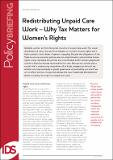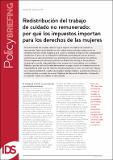| dc.contributor.author | Donald, K | |
| dc.contributor.author | Moussié, R | |
| dc.date.accessioned | 2016-01-25T09:20:54Z | |
| dc.date.available | 2016-01-25T09:20:54Z | |
| dc.date.issued | 2016-01 | |
| dc.identifier.citation | Donald, K. and Moussié, R. (2016) 'Redistributing Unpaid Care Work – Why Tax Matters for Women’s Rights', IDS Policy Briefing 109, Brighton: IDS | en |
| dc.identifier.uri | https://opendocs.ids.ac.uk/opendocs/handle/20.500.12413/7996 | |
| dc.description.abstract | Globally, women perform the great majority of unpaid care work. This unjust
distribution of labour has profound impacts on women’s human rights and is
both a product and a driver of gender inequality. Despite the obligations of the
State to ensure economic policies are non-discriminatory and prioritise human
rights, today regressive tax policies and underfunded public services perpetuate
women’s disproportionate responsibility for care. Because tax policies play a
crucial role in determining inequalities of all kinds, progressive national tax
reforms and improvements in global governance accountability are vital if we
are to effect positive change and achieve the new Sustainable Development
Goals, including the target on unpaid care work. | en |
| dc.description.sponsorship | UK Department for International Development | en |
| dc.language.iso | en | en |
| dc.publisher | IDS | en |
| dc.relation.ispartofseries | IDS Policy Briefing;109 | |
| dc.rights.uri | http://creativecommons.org/licenses/by/3.0/ | en |
| dc.subject | Gender | en |
| dc.subject | Governance | en |
| dc.subject | Work and Labour | en |
| dc.title | Redistributing Unpaid Care Work – Why Tax Matters for Women’s Rights | en |
| dc.type | IDS Policy Briefing | en |
| dc.rights.holder | IDS | en |
| dc.identifier.ag | OT/11009/3/1/5/320 | |



